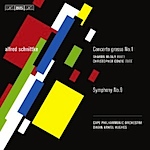Listeners familiar with Schnittke’s brilliant Concerto Grosso No. 1 will be quite surprised by this recording, as it features a revised version of the work replacing the two solo violins with solo flute and oboe. This gives an entirely different feel to the piece, substituting softer tones for the sharper contours of the original. I’m not sure this is for the better, as the original has a steely edginess that generates consistent tension (especially in the fine Deutsche Grammophon recording featuring Gidon Kremer and the Chamber Orchestra of Europe under Heinrich Schiff). Nevertheless, the revision’s kinder, gentler textures still hold interest–after all this is Schnittke at his high point–and it’s interesting to hear this imaginative and provocative music in new garb. Sharon Bezaly, Christopher Cowie, Owain Arwel Hughes, and the Capetown Philharmonic render the piece quite effectively, even if they can’t replicate the shock value of the original.
Symphony No. 9, Schnittke’s last work, lay incomplete at his death in 1998. The composer’s often scrawled sketches (he was writing while partially paralyzed by a stroke) were deciphered and reconstructed by Russian composer Alexander Raskatov, and the symphony was premiered in 2007. You get the sense that the music was heavily influenced by the suffering Schnittke was experiencing, for it is unremittingly bleak. And while some might argue that this is not necessarily a bad thing, being boring certainly is. The primary discernible thematic element is a fragmented upward scale that repeats to a point of annoyance. This profoundly bland motif appears throughout all three movements, and if nothing else it provides the ear something to latch onto in otherwise dreary environs.
With diligent listening you can pick out thematic connections, but it’s hardly worth the effort since the melodic material is so unmemorable. Schnittke does liven up the latter part of the first movement and parts of the finale with some aggressive tutti passages, but these merely stir the waters briefly before settling back into tepid grayness. It’s interesting that BIS chose to pair this with the Concerto Grosso No. 1; save for Schnittke’s unique and telltale instrumentation you’d be hard-pressed to identify the Symphony No. 9 as a work by the same composer.
In any event Hughes once again brings clarity and energy to Schnittke’s (or maybe Raskatov’s) dense writing, and the Capetown Philharmonic performs with a high degree of musicality. BIS provides its usual topnotch recording. A mixed bag then, primarily for dedicated Schnittke fans. Those interested in the Concerto Grosso should stick with Kremer.
































